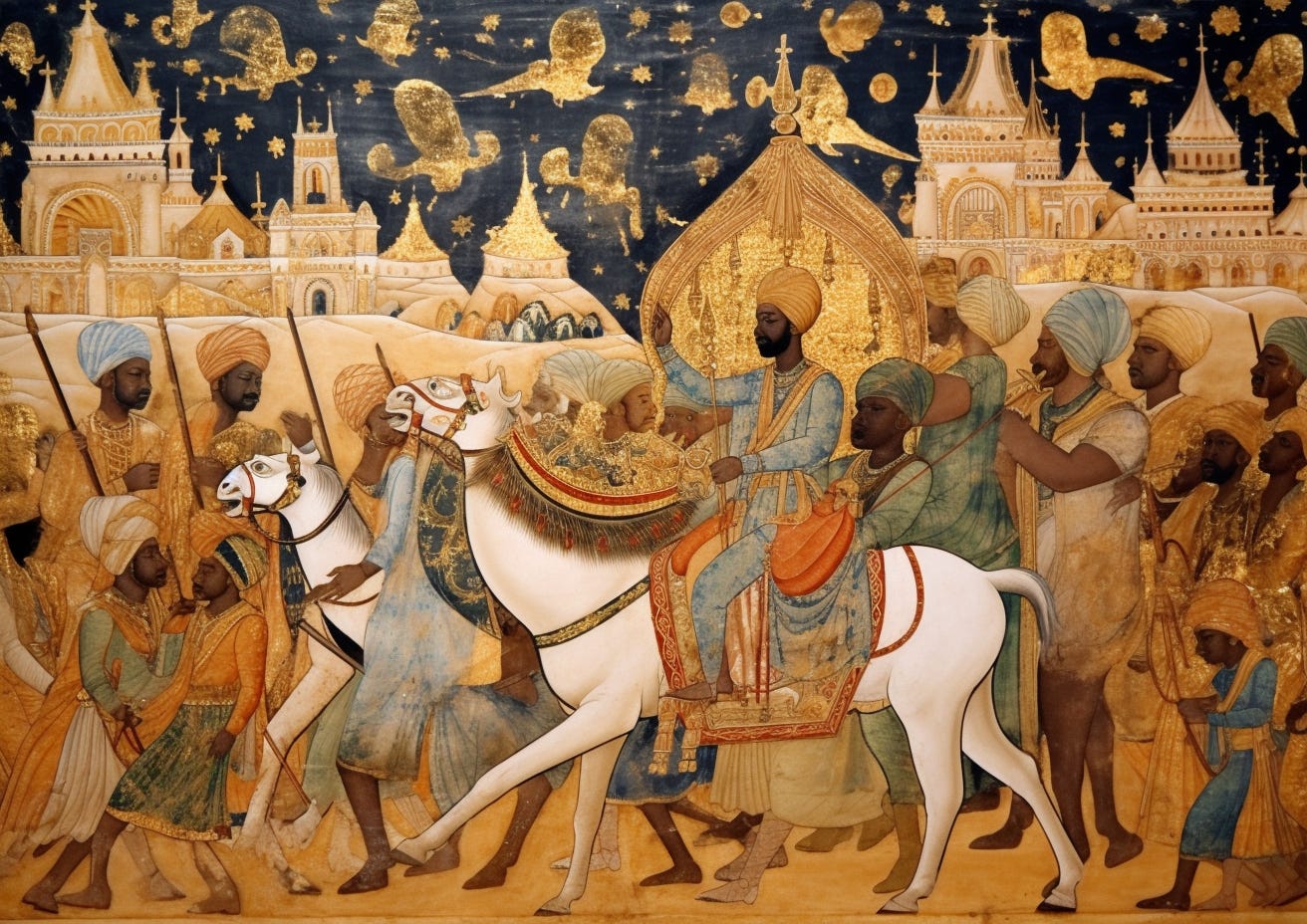I once presented a documentary for Italian TV which declared that Jakob Fugger - Fugger the Rich - was the richest man in history. He was a German who made his fortune in the 16th century through gold and copper mines, lending money to kings and popes and, above all, by selling absolution. By the time he died his net worth was equivalent to nearly 2.5% of European GDP, tantamount to half a trillion dollars in today’s money.
But, according to the internet (and we all know the internet is never wrong) there was someone even richer - a Malian gentleman, Mansa Musa the Ninth, or King Musa IX.
The BBC deems his wealth “indescribable”, placing him above the likes of Augustus Caesar, Andrew Carnegie, John D Rockefeller, William The Conqueror and Colonel Gaddafi in its Wealth Hall of Fame. Fugger doesn’t even get a look in.
So who was this Mansa Musa the Ninth?
Musa was born in 1280 in Mali in West Africa. At some point in his early 20s he became Mansa. The eighth Mansa, his brother Abu Bakr, had wanted to go and explore the edge of the Atlantic Ocean and Musa stood in for him while he was gone. Bakr never came back and so did Musa become Mansa.
Many of those out there with a dark view of human nature argue that Musa actually saw to it that Bakr never came back. The whole “exploring the edge of the Atlantic Ocean” thing was just a ruse. Who knows? Perhaps Bakr did make it to the edge of the Atlantic Ocean, also known as Brasil, found it to his liking, as many visitors there do, and decided to settle there.
At the time the Mali empire extended through 2,000 miles of West Africa - from what today is Niger in the east, through parts of Mali, Burkina Faso, Guinea, Senegal, Mauritania, Sierra Leone and Gambia. With land ownership came ownership of the natural resources that lay within - and that’s how Musa came to be so rich. Salt, gold and slaves. He sold hundreds of thousands of slaves to the Middle East, pioneering a pan African slave trade that still exists to this day. Those slaves he didn’t sell he put to work in his mines.
West Africa has always had lots of gold. Even today Ghana is Africa’s second largest producer, beaten only by South Africa, whose premium deposit, the Witswatersrand Basin, was only discovered in 1886 by an Australian mining prospector called George Harrison.
Harrison, by the way, in what must be considered among the worst business deals in history, worse even than record label Decca passing on Harrison’s namesake’s band, the Beatles, seventy years later, sold his stake for £10. Harrison was never heard of again, but his discovery would provide the world with over 20% of all the gold ever mined.
But, until the Wits Basin, West Africa was top dog. Indeed, according to the British Museum, something like half of the Old World’s gold came from the Mali Empire. Musa sure did enjoy the trappings. He had tens of thousands of slaves to his name and in 1324 set off with 12,000 of them and a retinue of 38,000 others, including soldiers and entertainers - all of them dressed in gold, brocade and silk, apparently - on a pilgrimage to Mecca.
Like today’s mega billionaires, Musa liked attention. He didn’t have rocket ships, Twitter or appearances on Saturday Night Live to get it, so Musa’s means was this hajj - a pilgrimage to Mecca, the spiritual home of Islam. The 2,800 mile round trip took him some two years.
Each slave carried some four pounds of gold, while camels behind towed as many as 300 pounds of gold dust, so that the entire transit had some 18 tons of gold in tow. There were heralds who bore gold staves, and, en route, every Friday, this devout servant of Islam had a mosque built, so the story goes.
When he arrived in Cairo, he went shopping. He did the same in Medina and Mecca. The sudden, dramatic rise in the supply of gold in those cities caused an inflationary collapse that took some 12 years to recover from.
Ever the businessman, the devaluation of the gold price because of the sudden new supply was apparent to Musa, so on his way back from Cair,o Musa then borrowed from money-lenders all the gold he and his retinue could carry. Cynics out there argue that his strategy - causing inflation then collapse - was a deliberate ploy to undermine the Cairo economy and relocate Africa’s commercial centre out to Mali in the West - to Gao or Timbuktu.
Over the course of his reign Musa conquered some 24 cities (and their surrounding districts) - among them Timbuktu, which he took on his way back from Mecca. Once back in Mali, Musa started throwing about his gold there too. For 440 pounds of gold, he hired the services of poet and architect, Abu Isaq Silla, to give Timbuktu a makeover. Universities and mosques were built and Timbuktu became something of a cultural centre - the “Paris of the Medieval World”, according to some. One of Musa’s buildings, the Sankore Madrassah, where maths, science, languages and the Koran were taught, is still operating today in the same capacity.
Musa died in 1337, at the ripe old age of 57, and the Mali empire began to fall apart soon after.
The inescapable laws of unsustainable spending applied as much then as they do today.
If buying gold to protect yourself in these uncertain times, my recommended bullion dealer is The Pure Gold Company, whether you are taking delivery or storing online. Premiums are low, quality of service is high. They deliver to the UK, US, Canada and Europe, or you can store your gold with them. More here.
My show on gold at the Edinburgh Fringe this August will take place at Panmure House, in the room in which Adam Smith wrote Wealth of Nations. You can get tickets here. Last show is Aug 20.













